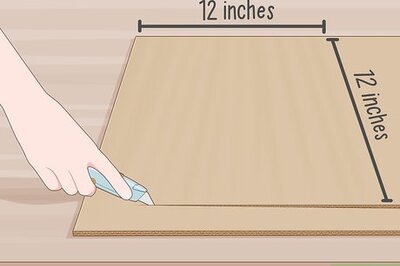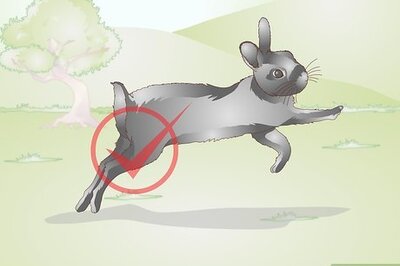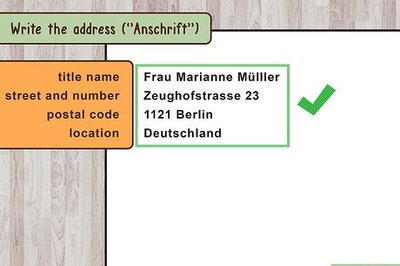
views
Understanding Parental Rights

Identify why you want to relinquish your rights. Often, parents hope to relinquish parental rights in order to avoid child support payments. They think that they can voluntarily give up their rights to the child, thereby ending any financial support obligations. However, a judge is unlikely to allow you to voluntarily relinquish your parental rights for this reason. Because the judge bases her decision on what is in the child’s “best interest,” it rarely matters that the other parent agrees that you can give up your parental rights. More likely, a judge will allow you to relinquish your parental rights if you are giving up the child for adoption. You can do this when you are a birth mother who does not want to raise a child or when the other parent has married someone who wants to adopt the child.

Distinguish between voluntary and involuntary relinquishment. In Georgia, parental rights can be involuntarily terminated for a variety of reasons other than adoption. For example, a judge can terminate parental rights if the parent has willfully abandoned the child, or if the parent has failed to follow a child support order for 12 months or more. If you want to avoid child support payments, you might think it is a good idea to abandon the child or stop paying child support. However, there is no guarantee that the state of Georgia will move to terminate your parental rights involuntarily. Nor is there any guarantee that the other parent will, either. Accordingly, you should not stop paying child support in the hopes that your parental rights will be terminated. All you will have accomplished is to accumulate child support arrearages. Once you owe unpaid child support, then the state can move to garnish your wages, put liens on your property, or suspend your driver’s license.

Meet with a lawyer. In order to figure out whether you can voluntarily relinquish your parental rights, you should try to meet with an attorney. A qualified attorney can help you decide whether giving up your parental rights is the best option for you. An attorney can also help you deal with child support obligations, if that is the reason you are trying to relinquish your parental rights. For example, a lawyer might help you petition the court to reduce your child support payments. For tips on how to find a family law attorney, see Find a Good Family Law Attorney.

Think carefully before relinquishing your rights. If you decide to give up your parental rights, then you will have no say in your child’s upbringing. You will have no legal right to decide where the child lives, what his or her education will be like, or what faith the child should be raised with.
Giving up the Child for Adoption

Contact an adoption agency. If you want to give up your baby and relinquish your parental rights at the same time, then you should contact an adoption agency. The agency can schedule an adoption and talk to you about your options. To find an adoption agency near you, you can search the Internet for “adoption agency” and your city or county. You can also see Put a Child up for Adoption for more insight on how to choose an adoption agency. If your child is older, then it may be harder to place the child up for adoption. You may have to contact your state’s Department of Child Protective Services if you find that you can no longer care for your child.

Sign an affidavit relinquishing rights. You will need to sign a document giving up your parental rights. The document should be drafted by a lawyer for the adoption agency or by a private attorney that you hire. Often, parents relinquish their parental rights where the other parent’s partner is willing to adopt the child. This adoption can happen at any time in the child’s life, not solely when the child is a baby. If this is the situation, then the other parent’s attorney could draft the affidavit for you. You then could meet with your own lawyer to review the affidavit and make any necessary corrections.

File the affidavit. If you are relinquishing your rights as part of an adoption, then your affidavit must be filed as part of the adoption action at a Superior Court where the child lives. You can let the other parent handle petitioning the court since the termination of your rights will happen at the same time as the adoption by the step-parent. However, you might want to ask the other parent to keep you updated on the case.

Attend a hearing. You may have to attend a court hearing before your rights can be terminated. The judge may want to ask you questions in order to understand your reasons for the relinquishment and whether it is voluntary. Be sure to answer all questions completely and honestly. Call the judge “Your Honor” or “Judge” and stand when speaking.
Giving up Your Child at a Safe Haven Drop-Off

Understand safe haven drop-offs. If you are unable or unwilling to care for your child immediately after their birth, you may be able to take your child to a safe haven drop-off spot. A safe haven drop-off spot is a location, designated by law, that you are able to drop off new born babies without the threat of legal action. In Georgia, the safe haven statute protects mothers who leave their children at designated safe haven locations in a designated manner. However, a mother can be prosecuted if the child shows signs of neglect or abuse.

Make sure your child is young enough. In Georgia, an infant's mother can drop off her baby at a designated location so long as the baby is seven days old or younger. These laws are aimed at providing a service for new mothers who did not arrange for their child's care prior to giving birth. Once a baby reaches the age of eight days old, you will not be able to take advantage of the safe haven law.

Find a drop-off location. Unlike many other states that allow you to drop your infant off at police stations, fire stations, churches, and or medical centers, Georgia only allows mothers to drop their infants off at designated medical facilities. Designated medical facilities include hospitals, institutional infirmaries, health centers, or birthing centers in the state of Georgia.

Drop off your child. When you find an appropriate location, take your infant and drop them off on location. You are required to leave your child in the physical custody of an employee, agent, or staff member of the medical facility. You cannot leave the child alone or simply drop them off at the front door.

Show proof of identity. When you drop your infant off at a drop-off location, you will need to show proof of your identity if you have it available. In addition, you will have to provide your name and address to the person who takes custody of your child.
Allowing a Step-Parent to Adopt Your Child

Talk to the other parent. If your previous partner with whom you have a child with is currently married to someone else, the step-parent may want to adopt your child. If you are in this scenario, sit down with your previous partner and discuss your options. If you want to relinquish your parental rights, tell the other parent that you are willing to do so during the step-parent adoption proceedings.

Make sure the step-parent is married to the other parent. In Georgia, the other parent must be married to the step-parent before the step-parent can file for adoption. A domestic partnership is not sufficient for this purpose.

Surrender your rights as a parent. After the step-parent has filed for adoption, you will have to, in writing, surrender all of your rights as a parent. You will fill out an affidavit and it will become a part of the adoption proceedings. Even if you do not voluntarily relinquish your parental rights, the court may do so for you if you have failed to communicate with your child in any meaningful manner or you have failed to care for your child in over a year.




















Comments
0 comment